Filed under: Uncategorized
Please enable Javascript and Flash to view this Flash video.
Please enable Javascript and Flash to view this Flash video.
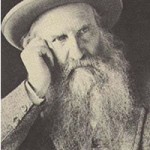
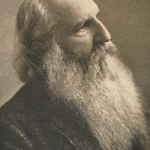
Maurice Bucke was born Richard Maurice Bucke in England 1837. His parents migrated to Canada where he was raised in a large farm working family. At age 16 he left home, traveling south through North America. When Maurice was 20 he was the sole survivor of a California silver mining party. He survived by walking over the snow topped mountains which claimed one of his feet and several toes.
Shortly after Maurice made his recovery he received an inheritance which allowed him to attend medical school. After graduation he worked as both a ship surgeon and a small town Dr. but Maurice’s true calling was with psychiatry. After further traveling and studying Maurice finally moved back to Canada where he married and had 8 children. He then landed his dream job as a superintendent of the asylum for the insane.
Although Maurice was a Dr. he had a strong passion for literature and an even greater appreciation after he read “Leaves of Grass” for the first time in 1869. It’s rumored that Maurice enjoyed the book so much that he had it memorized in its entirety. In 1872 after reading poetry with friends Maurice claimed to have an epiphany which brought him to a better understanding of life. He’s quoted in saying he was “lifted to and set upon a higher plane of existence”. It was this experience that later led to the writing of his most popular book Cosmic Consciousness, which claimed there was 3 stages in the development of consciousness the simple consciousness of animals, the self consciousness of humanity, and cosmic consciousness where the most successful and spiritual people reached. These people included the likes of Jesus, Muhammad, Dante, and yes of course Walt Whitman. Maurice’s claim that Whitman was higher in spirituality and importance gave him a lot of criticism.
Maurice’s break through theory of mental development wasn’t so far fetched as many ideas of the time revolved around evolution after Charles Darwin published On the Origin of Species.
In Philadelphia on business Maurice looked Whitman up and the two became close friends. In 1880 Whitman spent the summer with Maurice in Canada, observing the behavior of the mentally challenged. It was from this experience that Whitman wrote “Sunday with the Insane” in Specimen Days.
In addition to writing the cosmic consciousness Maurice also authored Whitman’s first biography in 1883. Maurice’s biography of Whitman was actually a collaboration of the two men. Whitman advised him in his writing and also wrote some portions of it himself. Whitman even stood in as editor to his work because he was always uncomfortable with Maurice’s inclination to portray him as a demi-god. Instead Whitman emphasized his own personality.
After the collaboration the two men stayed close friends and Maurice acted as Whitman’s private physician after his stroke in 1888 and continued to be until his death. After Whitman’s death Maurice lived for 10 more years until he slipped on a patch of ice and died from head trauma at 65.
Works Cited
Kaplin, Justin.Whitman Poetry and Prose. The Library of America Edition. Copy right . 1996. Walt Whitman (1819–1892). Prose Works. 1892. I. Specimen Days, . “Sunday with the Insane” p. 902-903
Nelson, Howard. The Walt Whitman Archive. Disciples: Biography, Richard Maurice
Bucke. http://www.whitmanarchive.org/criticism/disciples/tei/anc.00247.html
Wikipedia: The Free Encyclopedia. 22 July 2004. Wikimedia Foundation. 10 Aug. 2004
http://en.wikipedia.org/wiki/Richard_Maurice_Bucke
I have found that i like the elder Walt Whitman far better than the young. Perhaps its the darkness of death that appeals to me. Leaves of Grass really wasn’t my cup of coffee, Whitman was very monotonous with his young age. His life experiences are far more interesting than some of his writings. The writings were reading now that are Whitman accepting death i find very authentic.
I think Whitman is using these to sum up what his life was incase we over looked his previous works. In the Preface Note to 2nd Annex Whitman explains “here comes this little cluster, and conclusion of my preceeding clusters” (p637). He goes onto explain how his body and mind are both starting to deteriate. We all can agree that the gloomyness in these writings are unlike the persona that Whitman carrys with him. In a comical acknowedgement of this Whitman himself tells the reader “Reader, you must allow a little fun here-for one reason there are too many of the following poemets about death and for another the passing hours are so sunny-fine” (638).
With the semester coming to an end i’d have to say my initial dislike in Whitman’s writing has been elevated to an admiration in the guy. Despite ones likes or dislikes in works, no one can argue Whitman lived an uneventful life. The hightech side to this class is an experience in itself and i cant wait to begin filming for my final project. I feel i know Whitman pretty well and ideas run through my head all day.
I found Whitman along the Pennsauken Creek. Over the summer I Kayaked the water way and found a side of Camden County I never seen before, the side Whitman loved. The river way was completely unadulterated. Swarms of birds and herds of turtles riddled the water banks. The busy sounds of cars and people were completely absent. The short trip was very rejuvenating in all sense of the word and I understand why Whitman found the area to be therapeutic. I chose to recite my favorite Whitman poem “The Voice of the Rain” in the spot where I launched my Kayak. The quality of the video is poor but at the time of the recording rain was falling softly on this particular November evening.
Please enable Javascript and Flash to view this Flash video.
Today, November the 7th some of us Whitman scholoars from Rutgers Camden visited the Whitman House. The house is only blocks from Campus, Camden waterfront and eyes distance from Philadelphia. An awesome location… it must have been. We were informed before entering, the small corner of about 4 row homes is nearly all that survives Whitmans time era. The disreguarding unapreciative society that Whitman despised has cleared his quaint street of mature trees, artistic street way, and historic housing through demolition and rioting. Directly across from the house reside many of Camden’s finest, eloquently placed behind bars. Our tour guide Dick expressed, he feels Whitman would have enjoyed living next to the prison. Inquisitive maybe, but i doubt he nor anyone for that matter would enjoy living there. Fortunate for Whitman’s honor and the association their in the process of removing prison from its location.
In accordance to photos and the time era, the interior has been rehabbed exceptionally well. Many artifacts grace the living room almost to the T as it were. Although some objects from the photo are still missing people are on the hunt for them. Most of what is on display has been donated by his relatives and close friends.
The trip is a great looking glass to the time period but more importantly how Whitman lived his remaining years. As you could imagine few useless things were among his belongings. Mostly reading material, family photos, and excellent rocking chairs to contemplate in. One of the more interesting pieces in the house are at the top of the stairs “Whitmans Light Show”. Theres a window with a few stained glass squares among clear glass that illuminates the entire hallway at the right time of day. Im not sure if he made the window himself. I should have asked.
Overall the trip to the Whitman house was a good experience. Not a trip you would take twice but a must of any Whitman Enthusiast. You’ll learn about the man the neighborhood and the time era. The monotoned tour guy was very informitive and at times funny.
After leaving the House i took a quick drive passed Whitmans tomb. The cemetary is again in a poor location but the landscape within the gates are gorgeous. The rolling hills and tall gravestones seem to go on for miles. From photos Whitman’s tomb was impressive by its self but once your in the cemetary it puts the plane tomb into perspective. Still a great monument and final restingplace for Whitman, especially for paying only a fraction of its real cost. Many of the other tombs near by are marked by beautiful statues of angels and crosses. If you know Whitman you may wonder if he intentionally chose not to be guarded with them. No, instead Whitman has a quiet little hill to himself no surrounding tombs or head stones. Instead, beautifully rocked walls and trees in front. All in all the sights are a must for locals and enthusiasts just to say you’ve been there and done that.
The past couple weeks readings have been a perfect reflection of Whitman’s age. He seems to be dwelling on what hes loved and what he forsees. Particularly, this weeks reading Whitman is saying his good buy. In the poem “As at Thy Portals Also Death” Whitman sees his life coming to an end as did his mothers but he explains as she died her memory still remains. He says that in a way that implys after he is gone she will be forgotten. We know this isnt true and its because of him she will live in eternitity beside him. Although the poem is few in words it conveys a love unmatched. He explains everything about her was perfect and remembers each detail as if it were yesterday. The last line is very interesting ” I grave a monumnetal line, before I go, amid these songs, And set a tombstone here”. Here i think hes hoping that when he dies, others will remember him in the same way as he remembers his mother.
I think “My Legacy” was my favorite poem of these few. He may not have amassed a great wealth or many objects that so many others live for. Instead he lived in the moment grasping the simple things in life as well as friendships. And instead of leaving such materialistic things behind which he practically renounced in his life, he left us his eloquent words and life experiences. I think the title “My Legacy” is a perfect description of those words. he explains so much in so few words. Someone who hasn’t read much of his work wouldn’t see that but us scholars should.
Some of the other short poems were a little too short for me. So few words i dont feel can convey something as moving.
For those of you who have viewed Whitmans Disciples page should know how far out there they were. I wont talk much about them as they are my group progect. But to say the least they were a bit looney and a bit ingenious.
It’s no secret that Walt Whitman was infatuated with Abraham Lincoln. The two men had very similar beliefs and were committed to the union. The horrors of war did not shake his confidence in the president. The war was necessary, some citizens resented the president for his actions but most adored him. Following Lincoln’s assassination, Whitman was overcome by sorrow and expressed his adoration for the president in many poems. In addition to the poems, Whitman also toured the north east giving lectures on Lincoln’s life and death from 1879 to 1890. The tickets for these concerts are flimsy in appearance and plain in detail but the content that they offered was second to none.
Fourteen years after Lincoln left this life, Whitman decided to bring him back into the hearts of the people. He attempted to do so a year before in 1878 but fell ill and had to cancel the planned lecture. So, in 1879 Whitman’s life long dream of being an orator came true. The first lecture was held in New York. Whitman’s lectures revolved around Lincoln’s life and death as he experienced it. At the time of the assassination, Whitman was staying with his mother in Brooklyn. He recalls that very morning in Specimen Days, “The day of the murder we heard the news very early in the morning. Mother prepared breakfast-and other meals afterward-as usual; but not a mouthful was eaten all day by either of us. We each drank half a cup of coffee; that was all. Little was said. We got every newspaper morning and evening, and the frequent extras of that period, and pass’d them silently to each other” (p735-736).
Whitman’s lectures were a success because Lincoln was loved by most Americans. The lectures took the audience on an eye witness account of Lincoln’s death. Whitman used his famous descriptive imagery to captivate his audience and place them in the moment. Some of the lectures were held in small town halls primarily those in the Camden County area, but others were held in large theatres such as the Madison Square Theatre in New York.
Although Whitman himself never met the president he was close friends with Pete Doyle. Doyle attended the play at Ford Theatre the day of his assassination. Whitman took advantage of Doyle’s eyewitness account noting every minute detail. The lecture was unlike “When Lilacs Last in the Dooryard Bloom’d” where Whitman relied on abstract symbolism.
Whitman’s most notable association with Lincoln’s assassination is the lilac flower. In his speeches he would recall, “I remember where I was stopping at the time, the season being advanced, there were many lilacs in full bloom. By one of those caprices that enter and give tinge to events without being at all a part of them, I find myself always reminded of the great tragedy of that day by the sight and odor of these blossoms. It never fails” (p1065). As the years progressed so did his lectures. Although his audiences never exceeded more than a thousand, they did increase, and the attendees became more notable.
To attend these lectures was never much in cost. The most expensive was at New York’s Madison Theatre. Regular admission was a mere dollar and to reserve the seat another 50 cents. The day after that lecture on April 15th 1887 Whitman allowed George Cox to photograph him in celebration of the successful lecture. Its rumored he didn’t pose for a single photo, only spun around in his chair taking his hat on and off. It is this picture that Whitman is now most identified with. In regards to the picture, Whitman stated “it seems to me so excellent-“so to stand out from all the others”. He would later refer to the picture as “The Laughing Philosopher”.
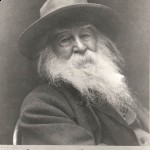
Whitman’s last lecture was given in Philadelphia. Toward the end of his tour his attendees became more notable and more abundant. His podium was in much larger arenas, unfortunately at the same time his health began to give. Two years before his last lecture Whitman suffered a second stroke. And two years after his Philadelphia lecture Whitman passed away. Whitman devoted the better part of his later years making sure Lincoln’s memory remained fresh in our minds.
The Lincoln lectures were filled with meaningful words of admiration to the president. It’s because of Whitman’s love for Lincoln that he was able to verbalize what he meant to him and to the entire nation. He was more than their president, he was one of them. Whitman eloquently sums up the presidents life and impact in a line taken from a reading copy of his lecture “with the first breath of a great historic triumph and in murder and horror unsurpassed Abraham Lincoln died. But not only the value he gave the New World in life survives for ever, but the value of his death survives forever”.
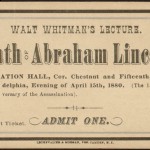
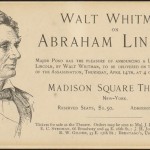
Bibliography
Cox, George C. New York 15 April 1887 Pictures and Sound Gallery of Images http://www.whitmanarchive.org/multimedia/image103.html?sort=year&order=ascending&page=11
Kaplin, Justin.Whitman Poetry and Prose. The Library of America Edition. Copy right 1996. Walt Whitman (1819–1892). Prose Works. 1892. I. Specimen Days, 21.The Stupor Passes-Something Else Begins p735-736
Kaplin, Justin.Whitman Poetry and Prose. The Library of America Edition. Copy right1996. Walt Whitman (1819–1892). Prose Works. 1892. II. Collect 9. Death of Abraham Lincoln p1060-1071
Whitman, Walt. Walt Whitman’s Lecture. Death of Abraham Lincoln. Philadelphia April15, 1880 Printed tickets Manuscript Division(34a,b ) http://www.loc.gov/exhibits/treasures/whitman-poetofthenation.html
Whitman, Walt. Reading copy “Death of Lincoln” Lecture http://www.loc.gov/exhibits/treasures/ww0035-trans.html
This weeks reading kept the momentum of the every day occurances in Whitman’s life. It was a big leap for Whitman to go from such a horrific experiences in the Civil War to what he loves. But its what Whitman loves that makes him the poet that he is. I loved reading about the familiar places, sounds, and scents that both Whitman and we share.
The first passage that brought both memorys and laughter to me was Whitman’s mention of a “crazy woman”. In Cedar-Plums Like-Names Whitman states ” Then in my rambles down in Camden county i once found an old crazy woman gathering the clusters with zeal and joy. She show’d, as I was told afterward, a sort of infatuation for them, and every year placed and kept profuse bunches high and low about her room”. Now im not certain but im sure it was very unusual to have such a thing in the house then. Now days, alot of people including my mother gather them from the yard and use them as a decoration around the house… Nothing of much significance just grabbed my attention and could relate to the crazy ladies infatuation.
In many of these writings Whitman talks about the Delaware river, its back stream beauty and how much joy it brought him to sit aboard the Camden ferry for the better part of a day. This passed summer, me and my girlfriend rented a kayak and traveled through the entire Pennsauken Creek. Alot of our friends made fun of us for doing so; saying how crummy it must have been. But in all honesty it was one of the most peaceful and beautiful kayak trips I’ve been on. Every single thing Whitman credited the North East with was present in that 4 hour adventure. That is where i found Whitman!
One thing i found interesting is how late in life Whitman was when he wrote Specimen Days. At the time, he was going through many health issues from his stroke to his every day struggles from the “dreary winter”. He mentions his body was almost always aching him then. I think what’s most important about Whitman is he didnt dwell on his own deteriation. Instead he kept a great diary of things he was in love with. In fact, it is Camden county that Whitman Credits his recovery to. He claims the area gave him a “…second wind, or renewal of the lease of life”.
Glory Opening SceneIn spirit of this weeks reading i screened the film Glory. For those who have not seen it, the film takes place during the Civil War. It follows an aspiring officer who has assumed the role of commander of one of the first all black regiments. The 54th Massachusetts which was entirely composed of volunteer african americans. The film is an excellent portrayal of the horrors of war and racial tension.
One of the very first scenes of the film take place after the initial battle. The young officer played by Mathew Broderick is minorly wounded in battle by shrapnel and passes out. Upon awakining he his taken to the battlefield hospital. It is here i believe the film captures Whitmans most vivid accounts of the grussome amputations that took course there. The screams of the soldiers from their wounds and surgery’s were not of men but mostly boys not much older than 17. Its crazy to think that the medical attention back then often perscribed amputation for any entry wound.
In Whitman’s “Bad Wounds- The Young” he refers to some of the wounds as “ugly hurts” these wounds i assume were from the artillery explosions as he mentioned in the poem but also those with missing limbs. Whitman explains as a nurse every day he entered those tents with the most cheerful and hopefully attitude so that it may rub off on the patients. A daunting task to say the least. I bring this up because the film Glory depicts an emotionless atmosphere in the hospital. Mathew Broderick lays hardly wounded as a nurse tends to his neck. They have a one sided conversation as the man talks to him about the emancipation proclamation. He hears the mans words but looks around the hospital.
The doctors help the nurses hold the patient with one hand while the other swings the meat cleaver violently at the mans body. Before doing so and after the fact, shouts from these boys ask them politely not to take their arms and legs. This scene is truly gutrenching and a visualization of Whitman’s experiences. I have attached the first part of the movie according to youtube. Its only 10 min watch the whole thing! Listen to the narration in the begining especially, it sounds like Walt. “we fight for men and women who’s poetry is not yet written but will presently be enviable and renound as any” Following that Mathew Broderick Quotes Emerson “A deep man believes that the evil eye can whither, the heart’s blessing can heal, and that love can overcome all odds”
The last minute of the clip is the hospital scene. Let me know what you think of the clip in its entirety.
http://www.youtube.com/watch?v=HKlbAGsDROY
Please enable Javascript and Flash to view this Flash video.
This weeks reading was extremely patriotic and revolved around the formation of our country. It is for this reason that i was most ingulfed with the reading for the first time. In each poem Whitman gives detailed emotion and sights that im sure derived from his own experience as a nurse during the civil war. A not so interesting mention but something that stuck out to me initially is Whitmans reference to the volunteer nurses as women when he indeed was one. ” The women volunteering for nurses, the work begun for in earnest, no mere parade now;” I was under the impression that both men and women volunteered their help in anyway possible as Whitman did in being a nurse himself. Im curious if the position of nurse was primarily for women as it was not to long ago for us.
In the mindset of of the civil war and its participants i was paying close attention maybe to close. One line references a general who stood in the middle of his unit and addressed his men reading the Decleration. The vision of the general standing firmly in his position and surrounded by his men reminds me of the second most famous confederate gerneral. Second only to Robert E. Lee, Stone Wall Jackson was famous for standing in one spot during the course of battle never moving. Ironically never being wounded or killed by an enemy soldier. Instead he was shot by one of his own soldiers and died 8 days after from an pnemonia.
Refreshing myself with Stone Wall Jacksons legacy i came across a poem written soon after his death and around the same time “Leaves of Grass” came out or better yet the third republication of it roughly 1960. The author is unknown but it’s very interesting to see a contemporary of Whitman’s; writing rhythmatic poetry with a southern mantality.
Let me know what you think!?

